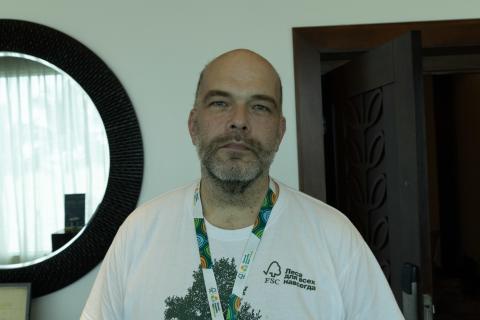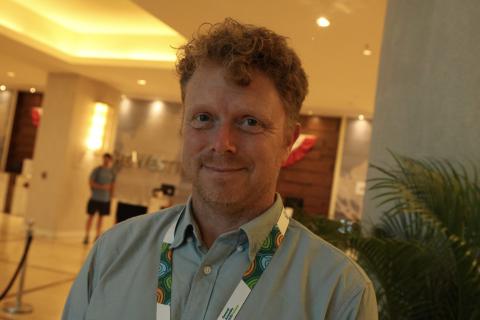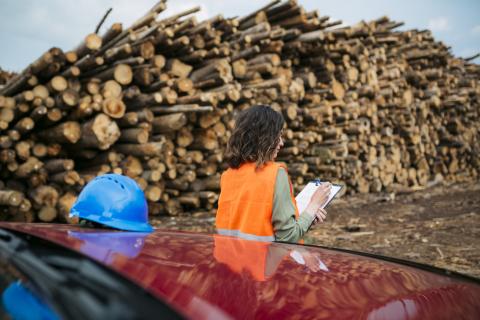Jaime Levy: A voice for Indigenous Peoples
Long-time supporter of FSC and a fierce advocate for community forestry operations, he understands the challenges for small and medium sized enterprises to access certification and make this a financially viable choice. Meet Jaime Levy, Executive Director of the Ecuadorian-based NGO Fundación Altropico and member of the FSC Board of Directors in this extended online interview.
FSC General Assembly 2011

 Long-time supporter of FSC and a fierce advocate for community forestry operations, he understands the challenges for small and medium sized enterprises to access certification and make this a financially viable choice. Meet Jaime Levy, Executive Director of the Ecuadorian-based NGO Fundación Altropico and member of the FSC Board of Directors.
Long-time supporter of FSC and a fierce advocate for community forestry operations, he understands the challenges for small and medium sized enterprises to access certification and make this a financially viable choice. Meet Jaime Levy, Executive Director of the Ecuadorian-based NGO Fundación Altropico and member of the FSC Board of Directors.
Mr. Levy works in Ecuador and Colombia, countries with very difficult government and business dynamics and a history with some dominant forest products businesses with a poor reputation. He brings a different voice to the FSC Board.
Why did you first become involved with FSC?
My idea has always been that if big timber companies participating in illegal logging and bending the law engage in certification, there would be third party supervision of their activities. This is something that in many cases the government is not able to do and that I felt FSC had the ability to do.
What’s been your experience on the FSC Board?
Honestly for me it’s been an excellent learning experience. During my term on the Board, I have tried to increase the participation of indigenous peoples that are members of the system but often not heard very much.
What changes have you seen in the FSC system since you joined the Board?
In the last two years or so since I’ve been a Board member, FSC is no longer on the brink of financial collapse. That has always been a problem. Now with the new fee structure that’s been introduced, resources have enabled FSC to strengthen itself. Many of the criticisms that FSC always receives is that there is not enough control over questionable certificates, not a quick enough response to the problems in the field around certificates. Now at FSC International more people have been hired, enabling the system to be more responsive to these kinds of problems.
Why is it important that indigenous peoples are involved in the P&C review process?
There are particular issues that concern indigenous peoples much more than other actors in the system. This has a lot to do with the fact that 40% of the native forests left in the world are in the hands of indigenous peoples.
I continue to think that FSC should be an important tool for these people, to both conserve their forest and also to get official recognition over their rights as indigenous people. We should remember that what sets FSC apart from other certification schemes is the social element in the forest. But it is a challenge to increase their numbers and to see that their voices are heard.
Do you believe that FSC engages with indigenous peoples groups effectively and why?
 I see the biggest problem being that there are no real incentives for indigenous peoples to get involved in FSC certification. The economic benefits don’t easily get to forest communities due to economies of scale, isolation, the context in countries in which indigenous peoples live, as well as corruption and governance issues.
I see the biggest problem being that there are no real incentives for indigenous peoples to get involved in FSC certification. The economic benefits don’t easily get to forest communities due to economies of scale, isolation, the context in countries in which indigenous peoples live, as well as corruption and governance issues.
Together, these make it very difficult for indigenous forest owners to reap the potential benefits of certification. There are some very notable exceptions around the world, but in general it is a very significant challenge.
What are the most effective ways for engaging indigenous organisations?
There has to be face to face contact. For instance, the meetings that FSC supported in different regions of the world for the Principles and Criteria review were extremely important. Otherwise it would have been extremely difficult to debate and analysis in a meaningful way. That’s one of the problems with FSC using digital technology to communicate with its stakeholders – it simply not the right forum for indigenous organisations today.
What are the risks of not meaningfully engaging indigenous groups?
One of the big risks is that it really weakens our system. If we can’t effectively engage these social actors –indigenous communities – then we´re not going to continue to strengthen the system. The number of certificates and the number of companies participating in the system is important, but if FSC is going to follow through with its original intent, it will have to find ways to better engage with other social actors. This is what makes us stand apart from other certification systems.
What issue do you think is most important for FSC to focus on?
As we see more and more interest in FSC by very large companies around the world – the largest paper companies and giant plantations – we forget the basis of what FSC is all about. We should remember that FSC was started by a group of people whose focus at that time was to help mainly communities in tropical forests to better manage their forests and gain access to better markets.
But over the years what we’ve seen is that it’s been mainly the large companies that have enjoyed the market benefits. This is a challenge that we still have to address. FSC IC now has dedicated more capacity to address the issue of engaging indigenous people and smallholders. It is still a big challenge for the system.



